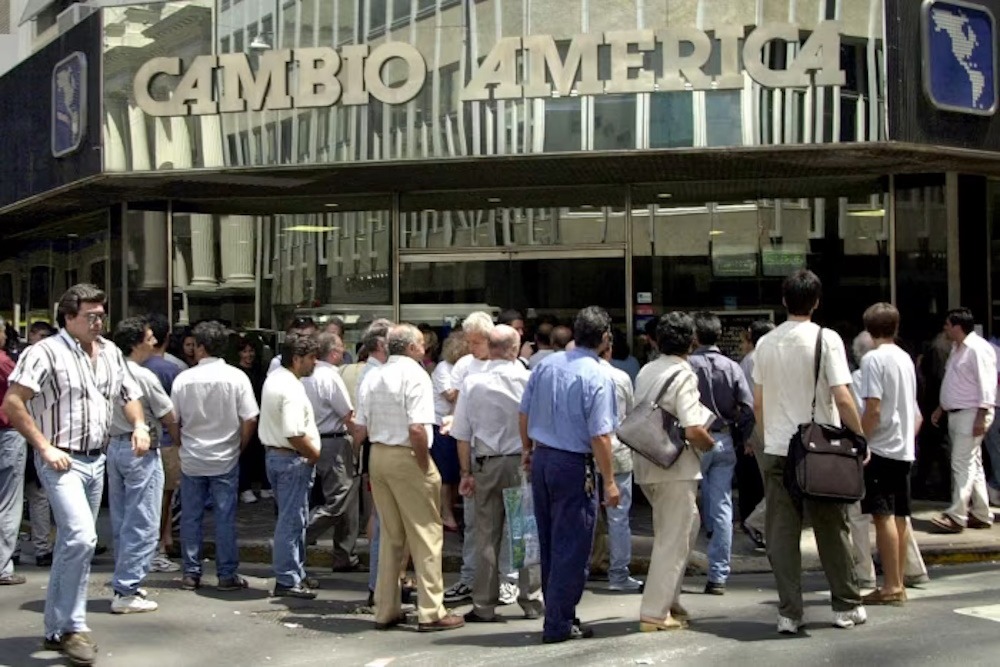Javier Milei’s reforms have introduced a degree of stability to Argentina’s previously tumultuous foreign exchange market, garnering commendations from investors. However, the overhaul is simultaneously driving the most significant wave of corporate defaults observed since the pandemic.
Local borrowing costs are experiencing a significant increase, particularly impacting companies that rely heavily on the peso. Many of these firms are facing challenges due to constrained cash flows and elevated debt levels following President Milei’s decision to eliminate most exchange controls for individuals.
More than six firms have either defaulted or engaged in debt negotiations this year, including the utility Grupo Albanesi, as Milei’s reforms have impacted them while they were already in a vulnerable financial state. That pressure is anticipated to persist, as balance sheets in sectors such as agriculture, energy, and manufacturing are already exhibiting indications of stress, according to Ezequiel Fernández, head of credit and equity research at Balanz Capital.
“If Argentina aims to shift its macroeconomic trajectory, a degree of ‘creative destruction’ at the micro level is essential,” Fernández stated. “After all, regime changes do create winners and losers.” The rise in defaults can be attributed to a financing strategy that has lost its efficacy. Prior to Milei’s tenure, firms exploited currency regulations by issuing bonds that were dollar-denominated but settled in the local currency, commonly referred to as dollar-linked bonds. In this context, numerous participants successfully secured negative rates as investors aimed to safeguard themselves against escalating inflation and currency devaluation.
In the first quarter of 2025, average interest rates for dollar-linked bonds increased to 11 percent, a significant rise compared to the five percent recorded in the same period the previous year, as reported by Moody’s Ratings. In response, sales of dollar-linked bonds experienced a significant decline, falling to merely US$2 million during the first quarter, a stark decrease from US$165 million in the corresponding period of 2024.
In the interim, corporations secured US$1.1 billion through the issuance of dollar-denominated bonds, a figure that surpasses the amount raised in the corresponding period of the previous year by more than twofold, with average interest rates holding steady at six percent, according to the report.
“In 2025, we are experiencing the highest number of defaults since the pandemic,” stated José Antonio Molino, associate director at Moody’s Local Argentina, a unit of Moody’s. “The dollar-linked market has virtually disappeared.” Since November, there have been eight instances of defaults, encompassing missed payments or restructurings, he stated. The assessment consolidates the three entities within Grupo Albanesi into a singular unit.
Milei’s austerity campaign is constraining margins, particularly within the manufacturing sector. Firms are contending with increased operational expenses, reduced consumer purchasing power, and intensified foreign competition as the appreciation of the peso has rendered it generally overvalued. The Economy Ministry of Argentina has not provided a response to the inquiry made for comment.
According to Molino, firms rated A+.ar and below on Moody’s Local Argentina scale, which generally includes mid- to small-sized companies, are presently encountering the most significant refinancing risks. Within the scale, an A.ar rating signifies “above-average credit quality relative to other Argentine issuers,” while A+.ar denotes the pinnacle of this category. “Refinancing risks remain high for the next 12-18 months due to low liquidity in the local market for mid-to small companies,” Molino stated. “We are witnessing a significant movement towards high-quality assets in the local market.
Meanwhile, issuers with access to global markets are expected to navigate the situation effectively, according to Luis Olguin, a portfolio manager at William Blair Investment Management in London. “It’s a bifurcation in credit issuers,” he stated. “Firms that engage with global markets typically possess a more extensive history and demonstrate greater transparency to international stakeholders.” Olguin’s firm currently lacks exposure to Argentine corporates due to the prevailing low yields, he stated.
Recent months have seen companies such as YPF, Pampa Energia, and Telecom Argentina effectively engage with investors. Others have not experienced the same fortune. In May, two subsidiaries of utility Albanesi failed to make an interest payment of US$19.5 million, which led to a reorganisation. Albanesi indicated in a statement that it is evaluating its alternatives, intending to put forth tangible proposals in the short term and striving for a “reasonable” resolution.
In May, the pulp and paper manufacturer Celulosa Argentina SA disclosed its inability to fulfill payment obligations on local law dollar bonds. In June, energy firm Petrolera Aconcagua Energia announced its intention to restructure its financial debt. Aconcagua announced its default on obligations associated with a contract involving Vista Energy and Trafigura Group. In an effort to circumvent enforcement actions, both firms proposed to acquire the company, contingent upon a restructuring of its debt and the successful completion of the due diligence process. “Many of the companies that defaulted were already running on borrowed time thanks to the FX controls,” stated Balanz’s Fernandez.

